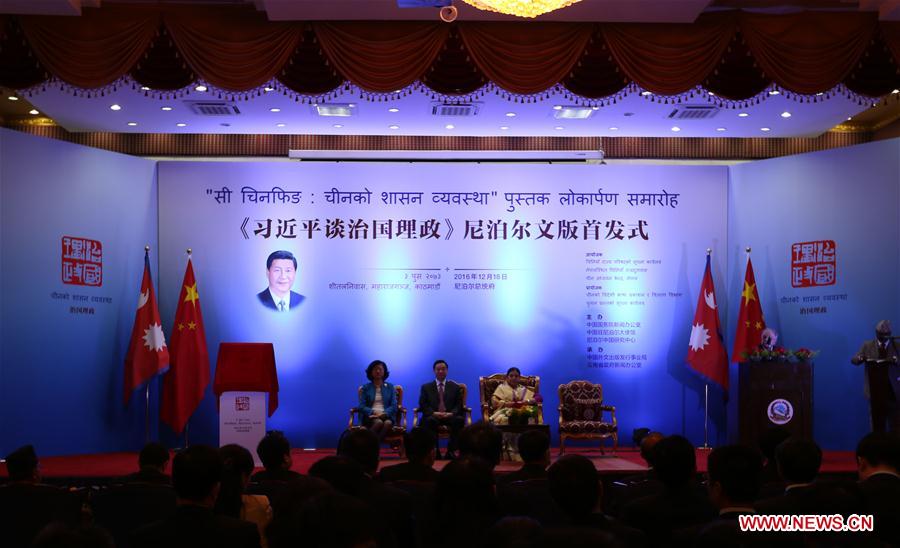KATHMANDU, Dec. 18 (Xinhua) -- The Nepali edition of Chinese President Xi Jinping's book "The Governance of China" has been released on Sunday in Nepal's capital city Kathmandu.

Photo taken on Dec. 18 shows the launching ceremony of the Nepali edition of Chinese President Xi Jinping's book "The Governance of China" in Kathmandu, Nepal's capital city. The highly-acclaimed book was released on sunday by Nepali President Bidya Devi Bhandari and Liu Qibao, a member of the Political Bureau of the Communist Party of China (CPC) Central Committee and head of the CPC Central Committee's Publicity Department, at the Presidential House Sheetal Niwas. (Xinhua/Zhou Shengping)
The highly-acclaimed book was released by Nepali President Bidya Devi Bhandari and Liu Qibao, the visiting member of the Political Bureau of the Communist Party of China (CPC) Central Committee and head of the CPC Central Committee's Publicity Department at the Presidential House Sheetal Niwas.
The book "Xi Jinping: The Governance of China" contains 79 speeches, talks, interviews, notes and letters of the Chinese leader between November 2012 to June 2014.
Releasing the book, Nepali President expressed belief that this book will help Nepali readers to better understand China and its development, foreign policies and social system.
"This book informs about the ruling system of China, dreams of Chinese leaders and deepens our world understanding. These sorts of publications help us to understand China from closer and boost our cultural relations," President Bhandari said in her speech.
Speaking highly of Xi as a visionary and committed leader for China's progress and prosperity, the Nepali President said that it's a matter of happiness to have a trustworthy friend like China, which has been supporting Nepal in its every development endeavor.
Distribution of the book, published in Chinese, English, French, Russian, Arabic, Spanish, Portuguese, German and Japanese in September 2014, has exceeded 5.2 million copies in some 100 countries and regions, according to the China Foreign Languages Publishing Administration (CFLPA).
The latest Nepali edition is published by China Study Center (CSC), an organization based in Nepal to promote Nepal-China relations with a focus on academic and multi-dimensional policy dialogue level.
Madan Regmi, Chairman at China Study Center told Xinhua, "The book is a perfect medium for Nepali people and especially for policy makers to understand today's China correctly and learn from it. It has clearly embodied Chinese vision, strategy of governance and rule of law and its future roadmap that can be quite encouraging for a neighboring country like ours."
He was of view that Nepali leaders should learn China's development and reforms and try to implement similar at home. He further expressed confidence that the first Nepali edition of the book will hit the bookstores since it's an essential reading for all.
"The book shows a clear way how China's friends could be integrated with China's amazing development, reform and modernization. It analyses factors and relationships that promote national capability and the challenges the state leadership face and must accept in today's world", Dr Upendra Gautam, General Secretary at China Study Center told Xinhua.
Dr Gautam, also one of the team members of publication, shared that it took nearly one year to complete the translation, editing and quality assurance works of the Nepali edition.
The translation and publication work was held in close collaboration with the Embassy of China in Nepal, the State Council Information Office of China, CFLPA and the Information Office of People's Government of Yunnan Province of China.
According to a Chinese book store in Kathmandu, nearly 500 English copies were sold alone in a short instant of time. The book has been highly appreciated by the intellectuals, scholars, journalists and diplomats in the Himalayan nation.
Prem Kumari Pant, editor of a local newspaper The Weekly Mirror shared with Xinhua, "It is a comprehensive piece about China, its development and its presence in the world. It can be taken as a guideline for the policy reforms."















